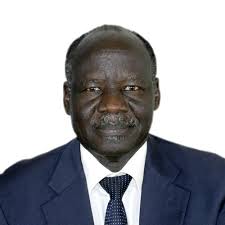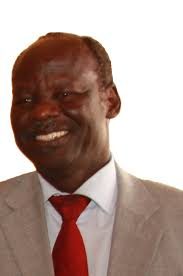PASTORAL MESSAGE OF THE CATHOLIC BISHOPS OF SOUTH SUDAN
TO THE FAITHFUL AND PEOPLE OF SOUTH SUDAN
“The voice of one crying out in the wilderness, prepare the way of the Lord, make his paths straight” (Mark 1:3).
Preamble
These words of the prophet Isaiah, quoted by the evangelists Matthew and Mark, have been greatly on our minds. We, the Catholic Bishops of South Sudan, have frequently written pastoral messages urging change in our nation, but it seems they have had little effect. Nevertheless, the Spirit is again calling upon us to write a pastoral message, to reassure you that we are aware of your situation, to make your voice known to the world, and also to include some of the concrete steps which we intend to take.
Therefore we address this pastoral message to the faithful people of South Sudan to give you hope and courage. At our meeting in Juba from 21st – 23rd February 2017, along with the Apostolic Nuncio to South Sudan and Kenya, Archbishop Charles Daniel Balvo, we “read the signs of the times”[1] and listen to what God is saying to us through the concrete situation in which we find ourselves. We have heard disturbing reports from all seven of our dioceses spanning the whole country, and have reflected on how we should respond. God is speaking to us.
The Situation in South Sudan
Our country is not at peace. People live in fear. The civil war, which we have frequently described as having no moral justification whatsoever, continues. Despite our calls to all parties, factions and individuals to STOP THE WAR, nevertheless killing, raping, looting, displacement, attacks on churches and destruction of property continue all over the country. In some towns there is calm, but the absence of gunfire does not mean peace has come. In other towns, civilians are effectively trapped inside the town due to insecurity on the surrounding roads.
While some fighting is between government and opposition forces, we are concerned to note that much of the violence is being perpetrated by government and opposition forces against civilians. There seems to be a perception that people in certain locations or from certain ethnic groups are with the other side, and thus they are targeted by armed forces. They are killed, raped, tortured, burned, beaten, looted, harassed, detained, displaced from their homes and prevented from harvesting their crops. Some towns have become “ghost towns”, empty except for security forces and perhaps members of one faction or tribe. Even when they have fled to our churches or to UN camps for protection, they are still harassed by security forces. Many have been forced to flee to neighbouring countries for protection. While the authorities may claim that they are free to return to their homes, in practice they fear to do so. In places the destruction has been described to us as “scorched earth”; what have people got left to return to? All of this is a form of “collective punishment”, which is outlawed as a war crime under the Geneva Conventions.
The level of hatred associated with the conflict is increasing. While soldiers might be expected to kill other soldiers in battle, the killing, torturing and raping of civilians is a war crime. However, not only are they being killed, but their bodies are being mutilated and burned. People have been herded into their houses which were then set on fire to burn the occupants. Bodies have been dumped in sewage-filled septic tanks. There is a general lack of respect for human life.
The perpetrators of these crimes, the so-called “unknown gunmen” who are usually in uniform and usually known, appear to act with impunity. We are still waiting for justice for the murder of our own dear Sister Veronica, a doctor who was gunned down by soldiers while driving a clearly-marked ambulance on 16th May 2016. Her killers were arrested, but we have heard no more and we await justice.
Our country is gripped by a humanitarian crisis – famine, insecurity and economic hardship. Our people are struggling simply to survive. While there have been poor rains in many parts of the country, there is no doubt that this famine is man-made, due to insecurity and poor economic management. Hunger, in turn, creates insecurity, in a vicious circle in which the hungry man, especially if he has a gun, may resort to looting to feed himself and his family. Millions of our people are affected, with large numbers displaced from their homes and many fleeing to neighbouring countries, where they are facing appalling hardships in refugee camps.
We are concerned that some elements within the government appear to be suspicious of the Church. In some areas the Church has been able to mediate local peace deals, but these can easily be undermined if government officials are removed and replaced with hardliners who do not welcome Church efforts for peace. Priests, sisters and other personnel have been harassed. Some of the programmes on our radio network have been removed. Churches have been burned down. Less than two weeks ago, on 14th February, security officers attempted to close down our Catholic bookshop. They harassed our personnel and confiscated several books. The ecumenical church leaders’ delegation which visited Pope Francis in Rome and Archbishop Justin Welby in London has been trying to obtain a meeting with President Salva Kiir since December 2016, but has so far been unsuccessful. We hear people saying that “the Church is against the government”.
We wish to inform all of you that the Church is not for or against anyone, neither the government nor the opposition. We are FOR all good things – peace, justice, love, forgiveness, reconciliation, dialogue, the rule of law, good governance – and we are AGAINST evil – violence, killing, rape, torture, looting, corruption, arbitrary detention, tribalism, discrimination, oppression – regardless of where they are and who is practising them. We are ready to dialogue with and between the government and the opposition at any time.
The Way Forward
We issue this pastoral message to the people of South Sudan, but we copy it widely to others, including the international community. We want the world to hear the true situation in which our people find themselves.
The Holy Father Pope Francis yesterday, 22nd February 2016, made an appeal for South Sudan from the Vatican. We have instructed our Caritas South Sudan and requested our Caritas Internationalis partners to act urgently to alleviate the humanitarian crisis in South Sudan, and we call on the rest of the international community to do the same.
Those who have the ability to make changes for the good of our people have not taken heed of our previous pastoral messages. This time we intend to follow up more proactively. In partnership with other churches through the Action Plan for Peace (APP) of our South Sudan Council of Churches (SSCC), we intend to meet face to face not only with the President but with the vice presidents, ministers, members of parliament, opposition leaders and politicians, military officers from all sides, and anyone else who we believe has the power to change our country for the better. We intend to meet with them not once, but again and again, for as long as is necessary, with the message that we need to see action, not just dialogue for the sake of dialogue. “In a certain city there was a judge who neither feared God nor had respect for people. In that city there was a widow who kept coming to him and saying, ‘Grant me justice against my opponent.’ For a while he refused; but later he said to himself, ‘Though I have no fear of God and no respect for anyone, yet because this widow keeps bothering me, I will grant her justice, so that she may not wear me out by continually coming.’” (Luke 18:2-5) Like that widow, we will comecontinually to bother those who are responsible in our country.
Again with our partner churches in SSCC, and with our church partners in neigbouring countries such as Kenya, Uganda, Ethiopia and Sudan, we intend to bring the narrative of our people on the ground to the governments of those countries, so that they can understand our situation and make good choices to improve it, both bilaterally and through multilateral bodies such as IGAD and AU. Our own special contribution will include bringing in the Catholic Church in those countries, regional Catholic bodies such as AMECEA, and the Vatican at the global level. When we meet the leaders of each country, we will be accompanied by the cardinals and bishops of that country.
We reiterate our support for the SSCC Action Plan for Peace (APP) and its three pillars of Advocacy, Neutral Forum dialogues and Reconciliation. It was always intended that the APP should be implemented by the member churches, not by the SSCC Secretariat alone, so we have instructed our Catholic Justice and Peace Commission, at both national and diocesan level, to begin a dialogue with SSCC on how we can contribute to the work on the ground.
We believe that “technical” programmes are not enough. Hence we have instructed our Pastoral Comission to mobilise a national spiritual approach, as we did for the Referendum.
We ask forgiveness for anything we might have done to alienate any individual or party, and we assure you of our love and prayers.
Conclusion
You are the Church; we are the Pastors. We call upon you to remain spiritually strong, and to exercise restraint, tolerance, forgiveness and love. Work for justice and peace; reject violence and revenge. We are with you. We have heard what God is saying to us through you and through your sufferings on the ground, and by including it in our public pastoral letter to you, we are making it accessible to the world. We will continue to be “The voice of one crying out in the wilderness”. We wish to give you hope that you are not abandoned and that we are working to resolve the situation at many different levels.
Finally, with great joy, we wish to inform you that the Holy Father Pope Francis hopes to visit South Sudan later this year. The Holy Father is deeply concerned about the sufferings of the people of South Sudan. You are already in his prayers, but his coming here would be a concrete symbol of his fatherly concern and his solidarity with your suffering. It would draw the attention of the world to the situation here. We call upon you to begin a programme of prayer for this visit to go ahead. Let us use the coming months fruitfully to begin the transformation of our nation.
May God bless you.
1. H.G. Archbishop Paulino Lukudu Loro, Metropolitan Archbishop of Juba.
2. H.L. Erkolano Lodu Tombe, Bishop of Yei.
3. H.L. Eduardo Hiiboro Kussala, Bishop of Tombura- Yambio.
4. Msgr. Roko Taban Mousa Apostolic Administrator of Malakal.
5. Msgr. Thomas Oliha Attiyah, Apostolic Admistrator of Torit.
6. Rev. Fr. Jermano Benardo Baka, Vicar General of Wau Diocese.
7. Rev.Fr. John Mathiang Machol, Coordinator of Rumbek Diocese.
8. H. L Vincent Mojwok Nyiker, Bishop Emeritus of Malakal.
9. H.L. Paride Taban, Bishop Emeritus of Torit.
Witnessed by H.G. Archbishop Charles Daniel Balvo, Apostolic Nuncio to Kenya and South Sudan.
Editor’s Note: The views expressed in the “Documents Page” are solely the opinions of the writers. The veracity of any claims made are the responsibility of the author’s and are not necessarily endorsed by The Malakal Post. The Malakal Post, reserves the right to edit articles before publication. If you would like to submit an opinion article or analysis, please email your article at: info@malakalpost.com















